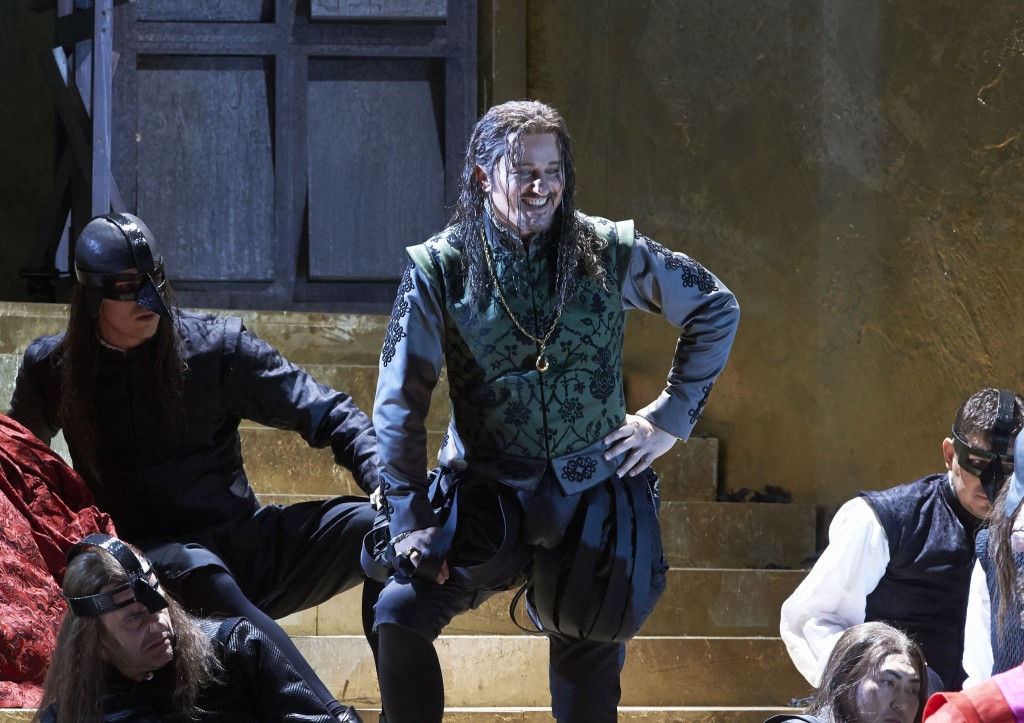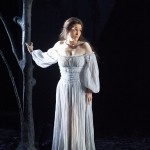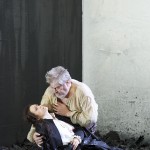 At Vienna State Opera, a new production ( directed by Pierre Audi) of Verdi’s Rigoletto. The first disappointment was that Simon Keenlyside had been replaced by baritone Paolo Rumetz as Rigoletto. And, in a barely intelligible pre-performance announcement, Rumetz had a cold. Rigoletto and his daughter Gilda (unexceptional soprano Erin Morley) are the crux of the opera. Even with bravura tenor Piotr Beczala as the Duke. So the performance was bound to be out of balance, showcasing glamour at the expense of the inner drama.
At Vienna State Opera, a new production ( directed by Pierre Audi) of Verdi’s Rigoletto. The first disappointment was that Simon Keenlyside had been replaced by baritone Paolo Rumetz as Rigoletto. And, in a barely intelligible pre-performance announcement, Rumetz had a cold. Rigoletto and his daughter Gilda (unexceptional soprano Erin Morley) are the crux of the opera. Even with bravura tenor Piotr Beczala as the Duke. So the performance was bound to be out of balance, showcasing glamour at the expense of the inner drama.
The second disappointment was Vienna State Opera’s new set (Christof Hetzer). We’re greeted by a snow-clad barren landscape, with stunted trees, stark branches. There’s a staircase leading to a wooden hut. The black/white grey monotones- Japanese influenced minimalism- are broken by a burnished copper back panel, like a late Turner impressionist painting. At least the costumes are ‘period’. But which? Rather 19th century frocks, the men’s breeches more 17th century- a mishmash.
Beczala, however, is splendid in the Duke’s opening aria: He takes his pleasure where he finds it (Questa o quella). He’s wearing a long wig- moustachioed like a Cavalier- and looks rakish, flirting with Count Ceprano’s beautiful wife. Beczala’s supremely confident, effortless virtuoso tenor, is made for the role. He dominates a very raunchy staging-a ball- the masked courtiers playing fast and loose with the ladies in long, low-cut gowns.
Paolo Rumetz, short, white-haired, appears rumbustious, firing wisecracks. But Chorus sing the Jester has a mistress; ‘the cripple has transformed into a cupid’, they mock him.
Count Monterone (Sorin Coliban), his incredibly deep bass from the depths of hell itself- wearing a blood-red silk outfit- interrupts the orgy. A dream from hell has led him there. He complains the Duke has seduced his daughter. Monterone, seized by the Duke’s soldiers, Rumetz taunts him with his sword. Monterone curses both Duke and his jester. Sensational playing from Vienna State Opera Orchestra under Myung-Whun Chung.
There’s a very rapid scene change -(too fast !)- to Act 2. ‘The old man placed a curse on me,’ (Quel vecchio male divami!) sings Rigoletto repeatedly. Rumetz- out of his court garb- is seen with Sparafucile, the assassin, Ryan Speedo Green flashily dressed in black: dark glasses, bearded, villainous looking in a black cap. They’re under a raised hut, the desolate landscape now darkened.
Rigoletto’s seminal aria Pari siamo ‘We are alike, the assassin with his dagger, he with murderous tongue’ is constantly interrupted by the refrain, ‘The old man put a curse on me!’ Verdi’s Rigoletto is a tragic figure depicted with psychological realism. ‘How terrible to be a cripple; a clown deprived of everyman’s right to weep. How he hates those scheming courtiers!’ Yet Rumetz failed to move me.
Upbeat flutes anticipate ‘the other person in his life.’ A wooden cage is lowered, containing a young woman, table and chairs. Yes, Gilda is virtually held captive by her over-possessive father, but this is too obvious! She only leaves the house to go to church: she’s never seen the town. 
‘At least tell me who my mother is’ Erin Morley, a brunette, in a white gown, sings angelically, ‘Calm yourself father!’- Rigoletto, ‘Only you are left to me! I am your father, that’s enough!’ Morley is well-sung, but characterless. In her aria, (she sings to her maid), the young man she meets in church is handsome, so refined. She wouldn’t want a nobleman. (The duke is disguised as a student.) Dreaming and waking her heart thinks only of him.
On cue appears Beczala in Titian-blue silk top. The god of love has inseparably bound his fate to her, he croons. In am outpouring of rhetoric, like a Petrarchan sonnet, ‘Fame, glory and power fade away…so let us love, divine creature!’ – ‘Tell me again you love me!’- He, ‘Adio, Adio, you alone will be my hope..’ Adio, she repeats. Now Erin Morley in her aria Gualtier Malde , to a limping version of his theme, sings of his beloved name Caro nome, emblematic of the delights of love. Morley, in a charcoal grey cloak, is delightful in a superficial way, her soprano exercising her register, an excuse for coloratura.
While she’s singing, her cage is lowered, and ‘cavaliers’ lounge around like dossers. Rumetz stumbles upon them. They sing of abducting Ceprano’s wife. But in the heist, he’s duped, blindfolded, bundled off in a cask. Verdi’s magnificent all-male chorus sings ‘Quietly let us take our revenge. We’ll steal his mistress and he’ll be the laughing stock at court.’ Vienna State Opera Chorus can do Verdi like no other (outside Italy.) But why this dismal staging?
Act 3 opens in what’s supposed to be the Duke’s palace (here like a rehearsal room of stage panels.) Beczala sings, where can my angel be. Due to her purity, he was overcome by virtue…It’s almost convincing. (But he’s the incorrigible lecher in the last Act.) Believing his own rhetoric, Beczala is carried away by his gorgeous tenor. Empty, but applauded, ironically!
The chorus, his courtiers, sing jauntily, ‘Together walking down there at nightfall, we discovered a beauty, Rigoletto’s mistress!’ They sing of how their Prince’s mood has changed. ‘Love summons me. I fly to her!’ Beczala to the rescue, his gleaming white teeth like a matinee idol.
Rumetz as the grief-stricken Rigoletto is – after the recent triumph of Leo Nucci here – frankly disappointing. Rumetz wears a white top with ruffed collar instead of jester’s harlequin. Rigoletto’s appeal for his daughter should be hardly bearable. ‘Cowardly courtiers, you can have everything for money,’ is simply lacking the power required. ‘I can only weep’; he appeals to one courtier’s kind heart. He’s bumbling, fumbling, pathetically enacting his tragedy; but the voice is not up to projecting it musically. Low key even against the (superb) cello accompaniment. ‘Give me back my child!’-but his anger isn’t conveyed (against these courtiers he once dominated.)
With Gilda, ‘It was just a prank. But why are you weeping!’- ‘The disgrace!’ In her powerful aria Gilda confesses every day in church she met her student. ‘Then he left, and I was filled with hope.’ But although perfectly sung, Morley is superficial. Rumetz sings how he fought to keep her from corruption; and poignantly ‘Weep my child to my heart’. Sorry, it’s not Verdi’s overwhelmingly moving father-daughter bonding.
 Act 4 (and the white/grey abstract stage curtain) reveals a Japanese structure, white screens either side. Upper floor of Verdi’s ‘inn’ Maddalena (Elena Maximova) wears a red-lined cloak. Beczala’s Duke-disguised delivers the La donna e mobile aria, magnificently swaggering. ‘Her pretty face is false, whether weeping or smiling.’ Arrantly sexist, misogynist, but it’s sung with panache: Beczala’s male peacock besotted in self-glory, revelling in his own voice. ‘You must know I love only you,’ sings Beczala. (‘Traitor’, sings Gilda off-stage.) Then Maximova’s buxom blond in bright-red silk frock is sitting outside at a café table. She’s dangling her legs. They’re almost making love- while Gilda beholds them, side-stage, in torment.
Act 4 (and the white/grey abstract stage curtain) reveals a Japanese structure, white screens either side. Upper floor of Verdi’s ‘inn’ Maddalena (Elena Maximova) wears a red-lined cloak. Beczala’s Duke-disguised delivers the La donna e mobile aria, magnificently swaggering. ‘Her pretty face is false, whether weeping or smiling.’ Arrantly sexist, misogynist, but it’s sung with panache: Beczala’s male peacock besotted in self-glory, revelling in his own voice. ‘You must know I love only you,’ sings Beczala. (‘Traitor’, sings Gilda off-stage.) Then Maximova’s buxom blond in bright-red silk frock is sitting outside at a café table. She’s dangling her legs. They’re almost making love- while Gilda beholds them, side-stage, in torment.
‘You see how he lied to you’: Rigoletto with Gilda, will make sure she’s avenged. Again the La Donna refrain ‘woman is wayward’.
‘The moment of vengeance is here at last’. (Mysterious night, a storm in the heavens.) The body-sack is dragged out of Sparafucile’s cellar. ‘Just take a look at me, the Jester! Now he’s at my feet.’ Then the Duke’s refrain from the inn. The voice a delusion? Then the realisation that it’s Gilda -whom he’d sent away – in the sack. My daughter, impossible? Yet there’s hardly any modulation to Rumetz’s register, just going through the motions.(What a contrast to the unbearable intensity of Nucci’s rendering.) Even Morley hardly convinces as the dying woman. She’d deceived her father, died for her Duke. ‘Do not die, you must not leave me alone.’ -‘In heaven’, her reply softens celestially. 
It didn’t move me. And the applause-over after only the minimum curtain calls-indicated that the Vienna audience weren’t all that impressed either. P.R. 30.12.2014
Photos: Piotr Beczala (Duke of Mantua); Erin Morley (Gilda); Piotr Beczala (Duke) and Maddalena (Elena Maximova); Paolo Rumetz (Rigoletto) and Erin Morley (Gilda)
(c) Wiener Staatsoper / Michael Poehn

Saw Rigoletto on Public TV, with Beczala as Duke, and read several glowing reviews. I fear for Mr.Beczala’s future if he continues to sing with his current technique or repertory so unsuitable to that technique.(…)
From the reviews I did not recognize what I had heard.
The role of the Duke of light to medium weight for the flamboyance of the character and the florid music he is given is not the same as Otello or even Chenier.It requires flexibility, some ease of production and, preferably, a little squillo.
It is not necessarily an easy role but should sound fairly easy.
The reason for my concern for Mr. Beczala is that his vocal production throughout was laboured, “forced” and generally unpleasant with the listener wondering if he would make it through the next number or high note, and of course his usual facial contortions did not help.
My usual hearing of this tenor is a much lighter and more beautiful and easier production, although his acting was fine, his sound was adversely affected by what appeared to be the tenor’s struggle to get through the opera, not withstanding what appeared to be the audience positive reaction., the same audience that was watching alive performance in the theater and not the close up tv exposure.
In short, the singer always appeared to be at the end of his rope and certainly gave that appearance as well as sound.Presumptively, the suggestion is that with good help he review what I heard and consider a careful review of his vocal technique(…)
Thanks, Clyde, for your comment, which was well argued, but too long to publish in its entirety.
You saw a video on Public TV, without mentioning the production, and other cast.
I reviewed a live performance of Vienna State Opera’s Rigoletto in January 24th 2015. I did write ‘Beczala’s supremely confident, effortless tenor is made for the role.’ However (in the context of this production), ‘showcasing glamour at the expense of the inner drama.’
Much has changed in the last seven years, including, possibly, Mr. Beczala’s interpretation, and vocal range.
Hello There. I discovered your weblog the usage of msn. This is a really well written article. I will make sure to bookmark it and come back to read extra of your helpful information. Thanks for the post. I抣l certainly comeback.